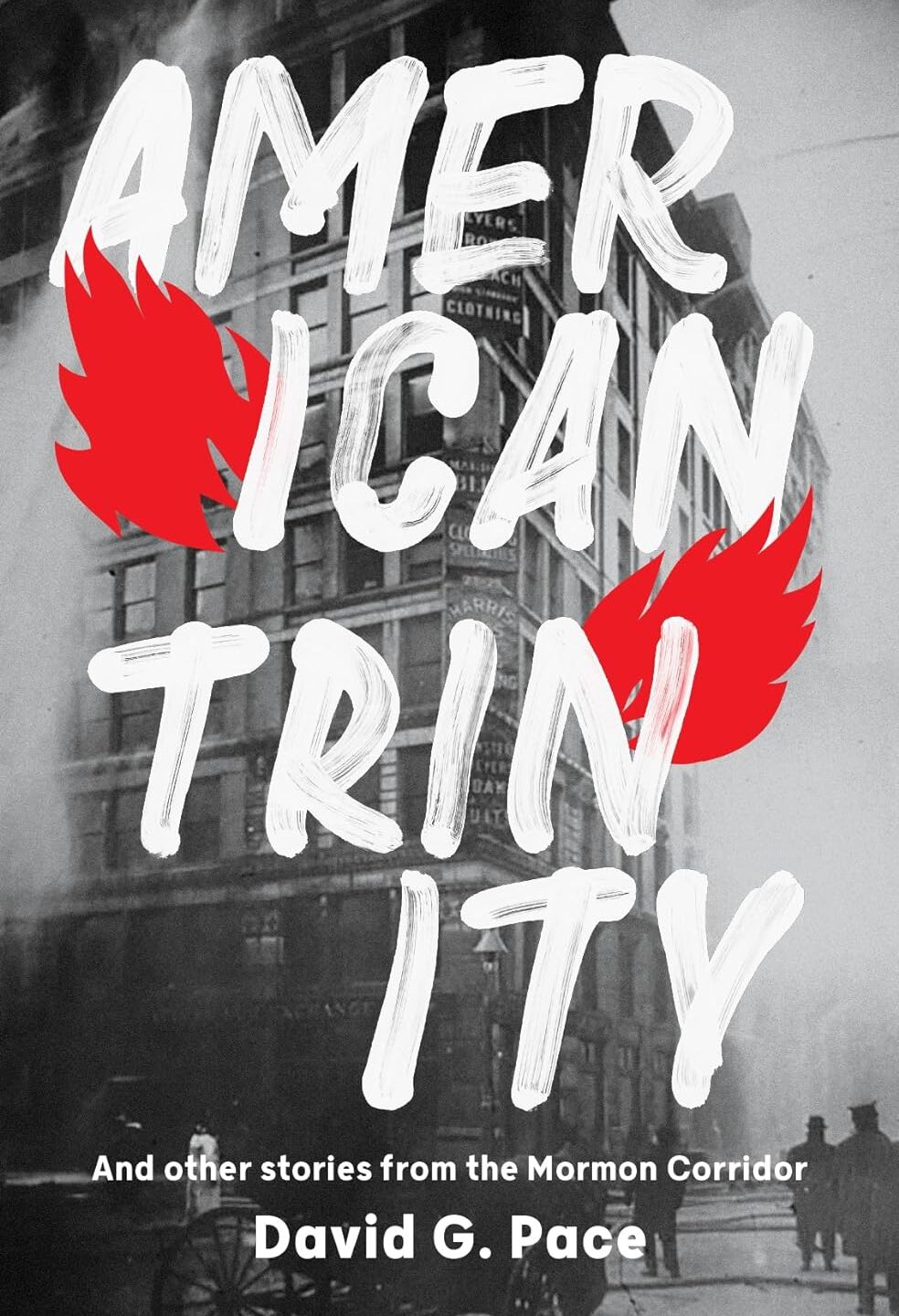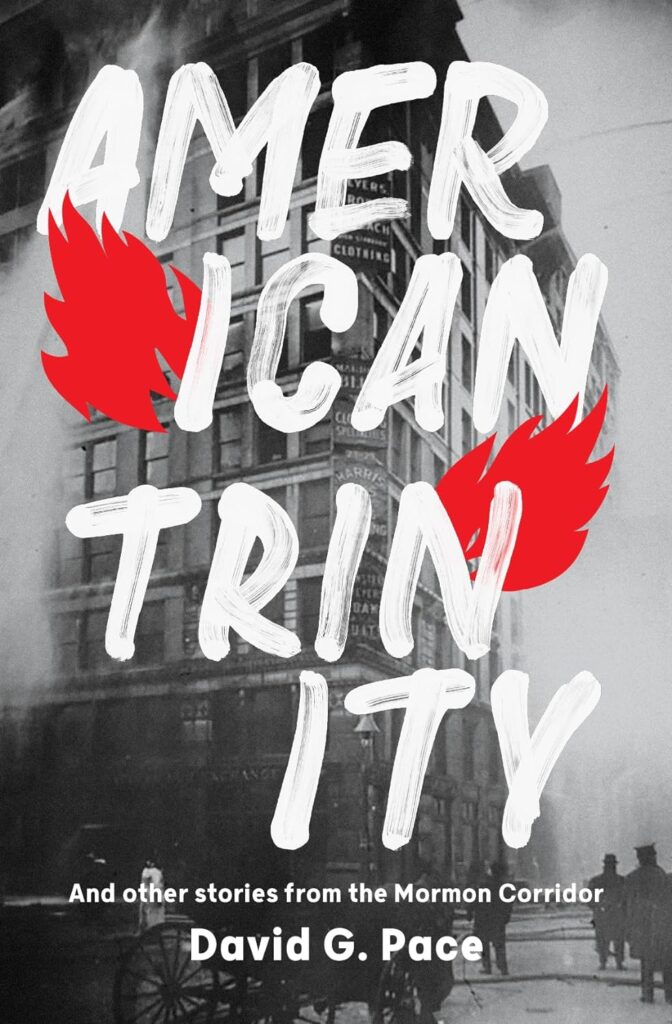by David G. Pace
Twelve stories that span the Mormon Corridor—a geographical as well as, now, globally psychic space inhabited by America’s most “successful” indigenous religion.
At times rendered through life’s daily grind (politics, marriage, acquiring an STD… and too many parking tickets), other times through the supernatural and fabulist (angels and personified names of the dead ripped from the real-life Utah mountain vault filled with genealogical records), these are Latter-day Saints who see things “Mormonly” (with apologies to “New Englandly” Emily Dickinson) both driven and riven by their frenetic and sacralized sense of community, their orthodoxy, their doubts and their awkward (often futile) rebellions to comical, poignant, sometimes harrowing ends.
**
These stories “convey the longing of those who are in some sense out of communion: lonesome, solemn, wandering, cast out, unrecognized by the Church or their own people. But they need not worry that there is no book that—transcending orthodoxy and disbelief—captures enough in-between-ness to find themselves in. David G. Pace has written it. That’s what you call the power of a text.
—From the Foreword by Christopher T. Lewis
*
David Pace’s exhilarating new collection, American Trinity, fashions a new set of mythologies from the material of Mormon America—tales of doubters and believers, angels and heretics, the sacred and the profane. With wisdom and humor, these ambitious stories use the particularities of LDS culture and history as a lens to examine the most profound, universal elements of human life—producing a collection that speaks powerfully to Mormons and non-Mormons alike.
–Shawn Vestal, author of Daredevils and Godforsaken Idaho
*
Pace’s short fiction is affecting and illuminating. He writes unflinchingly, depicting those at the margins – the doubters, the diffident, and the disconsolate, with sensitivity, compassion, and humour.
–Carys Bray, author of A Song for Issy Bradley
*
There is deep pleasure to be found in the pages of David Pace’s gorgeous collection of short fiction, American Trinity. These are moving narratives, steeped in wise and evocative contemplation, luminous with Mormon Americana. Pace deftly plumbs the sometimes dark, often difficult depths of faith and loss with an insider’s knowledge and an angel’s compassion. He is, without doubt, one of the finest storytellers to come out of the Mormon experience.
–Robert Hodgson Van Wagoner, author of The Contortionists and Dancing Naked
*
A former Mormon, David Pace with his deep concern for humanity and marvelous insights, brings members’ struggles to light, showing how the LDS religion both feeds and strains the heart. These stories are brilliantly rendered, wildly funny and touching, as Pace reveals his characters’ conflicts with their beliefs in Mormonism’s rigid rules. We learn about the quirks of baptism of the dead, how sexual relationships are affected, as well as members’ unique turmoils about leaving the religion, or going back to it, and much more. A lapsed Catholic, I feel that any Mormon or other person raised with strict faith, will love these stories as well as non-religious readers curious about the secret lives of the Mormon faithful, and unfaithful. I could not put this book down. Well researched and intelligent, this is some of the finest fiction I have read about a religious culture, and some of the finest fiction I have ever read.
–Nancy Takacs, author of Dearest Water
*

WINNER OF THE 2024 Best Short Story Collection Prize
Association for Mormon Letters
Citation:
David G. Pace. American Trinity and Other Stories from the Mormon Corridor. BCC Press
In American Trinity, Pacedeftly dissects the cozy platitudes and idiosyncrasies of our faith. He knows the people of “The Corridor”—multigenerational descendants of Mormon pioneers—and what makes them dyed in the wool. Pace writes of their complications, secret sorrows, and peculiar pains. His stories spring from a well of heartbreak and humor, frighteningly familiar but fresh: a childless wife tries to rediscover temple work by performing ordinances for a dead movie star; a married couple quibbles over the spiritual implications of a presidential election; a General Authority grapples with sorrow and disillusionment in his new calling. And in the masterfully executed title story, “American Trinity,” one of the Three Nephites goes rogue, searching for the lost God he once knew and loved.
In elegant prose laced with stunning metaphors, Pace explores themes that resonate with readers of all stripes: love, friendship, faith, sacrifice, family, death, duty. But the common thread that speaks to the heart of LDS culture is disappointment. What happens when the grand visions of exaltation, godhood, and eternal families collide with overzealous meter-maids, Sunday School burglars, and the screams of horrified children leaping from a burning building? What happens when the Covenant Path is impassable, and disappointment spawns disillusionment, and liberation means having the courage to walk away? Or in the words of a soon-to-be ex-missionary: “Mormonism may be a beautiful thing, you know. It just can’t be what it has always claimed to be. And no one here wants to hear that.”
Pace’s characters are all wanderers who find religion “pure and undefiled” not in the sterile confines of a building, but in the daily grit and grime of the Wasatch Front. For Pace, goodness prevails over to-do lists, blind obedience breeds spiritual paralysis, certainty is sin, and doubt is an essential virtue. In a crisis, “the regularity of church meetings” should be, “torn to shreds as everyone drops their scriptures for a shovel.” In true Zion, “the only unforgivable sin is to dismiss someone else’s pain.”
This landmark collection is not a sucker punch though Pace hits us in tender places but never with malice. We smile and salute the genius of it, even when we disagree. Here we do agree with another Pace character: “What I want is not the same as what I need.”
Other finalist: Ryan Habermeyer. Salt Folk


